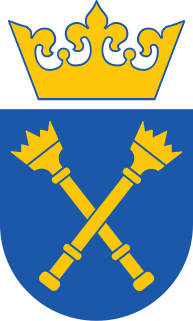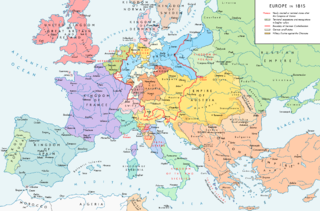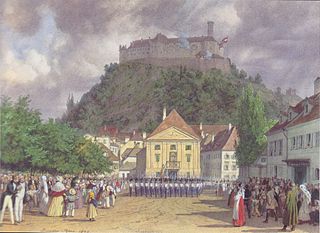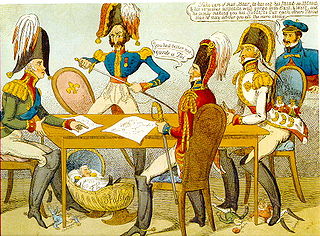Vienna Convention can mean any of a number of treaties signed in Vienna. Most are related to the harmonization or formalization of the procedures of international diplomacy, but some are not.

The Jagiellonian University is a public research university in Kraków, Poland. Founded in 1364 by the King of Poland Casimir III the Great, the Jagiellonian University is the oldest university in Poland, the oldest Slavic university, the second oldest university in Central Europe, and one of the oldest surviving universities in the world.

The Congress of Vienna of 1814–1815 was the most important international diplomatic conference in European history, reconstituting the European political order after the downfall of the French Emperor Napoleon I. It was a meeting of ambassadors of European states chaired by Austrian statesman Klemens von Metternich, and held in Vienna from November 1814 to June 1815.
Treaty of Paris may refer to one of many treaties signed in Paris, France:
A grand duchy is a country or territory whose official head of state or ruler is a monarch bearing the title of grand duke or grand duchess.
The Congress of Troppau was a conference of the Quintuple Alliance to discuss means of suppressing the revolution in Naples of July 1820, and at which the Troppau Protocol was signed on 19 November 1820.

The Concert of Europe refers to a general consensus among the Great Powers of 19th Century Europe to maintain the European balance of power and the integrity of territorial boundaries. Never a consensus, and subject to disputes and jockeying for position and influence, the Concert represents an extended period of relative peace and stability in Europe following the Wars of the French Revolution and Napoleonic Wars which had consumed the continent since the 1790s. It is typically divided into two phases with different dynamics, the first from 1815 to the early 1850s or 1860s, and the second from the early 1880s to 1914.
Paris Peace Conference may refer to:

The Congress of Laibach was a conference of the allied sovereigns or their representatives, held in 1821 as part of the Congress System which was the decided attempt of the five Great Powers to settle international problems after the Napoleonic Wars through discussion and collective weight rather than on the battlefield. A result of the Congress was the authorization of Austrian intervention in the Kingdom of the Two Sicilies in order to quell a liberal uprising.

The Congress of Verona met at Verona on 20 October 1822 as part of the series of international conferences or congresses that opened with the Congress of Vienna in 1814–15, which had instituted the Concert of Europe at the close of the Napoleonic Wars.

The Congress of Aix-la-Chapelle, held in the autumn of 1818, was a high-level diplomatic meeting of France and the four allied powers Britain, Austria, Prussia, and Russia which had defeated it in 1814. The purpose was to decide the withdrawal of the army of occupation from France and renegotiate the reparations it owed. It produced an amicable settlement, whereby France refinanced its reparations debt, and the Allies in a few weeks withdrew all of their troops.

The Belgian Revolution was the conflict which led to the secession of the southern provinces from the United Kingdom of the Netherlands and the establishment of an independent Kingdom of Belgium.

Mikołaj Firlej was a Polish nobleman (szlachcic), hetman, diplomat, and expert of southeast Europe.
Treaty of Vienna may refer to:

Jan Hertrich-Woleński is a Polish philosopher specializing in the history of the Lwów–Warsaw school of logic and in analytic philosophy.

The First Congress of Vienna was held in 1515, attended by the Holy Roman Emperor, Maximilian I, and the Jagiellonian brothers, Vladislaus II, King of Hungary and King of Bohemia, and Sigismund I, King of Poland and Grand Duke of Lithuania. Previously, Vladislaus and Maximilian had agreed on a Habsburg-Jagiellon mutual-succession treaty in 1506. It became a turning point in the history of central Europe. After the death of Vladislaus, and later his son and heir, the childless King Louis II at the Battle of Mohács against the Ottomans in 1526, the Habsburg-Jagellion mutual succession treaty ultimately increased the power of the Habsburgs and diminished that of the Jagiellonians.
Vienna is the capital and a federal state of Austria.
Vienna Conference can refer to:

The Jagiellonian dynasty was a royal dynasty, founded by Jogaila, the Grand Duke of Lithuania, who in 1386 was baptized as Władysław, married Queen Jadwiga of Poland, and was crowned King of Poland as Władysław II Jagiełło. The dynasty reigned in several Central European countries between the 14th and 16th centuries. Members of the dynasty were Kings of Poland (1386–1572), Grand Dukes of Lithuania, Kings of Hungary, and Kings of Bohemia (1471–1526). The dynasty was a cadet branch of Gediminids.
This page is based on this
Wikipedia article Text is available under the
CC BY-SA 4.0 license; additional terms may apply.
Images, videos and audio are available under their respective licenses.









